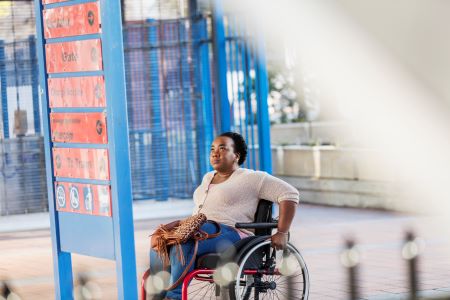MAJOR FAILINGS occurred in how the government communicated with Black disabled people during the pandemic, a new report has found.
The report from the Commission on COVID-19, Ableism and Racism, set up by the Voluntary Organisations Disability Group (VODG), says that systemic racism embedded in the government’s responses to the pandemic may have worsened outcomes for Disabled Black and minority ethnic people.
The Commission’s findings highlighted a number of issues including the difficulties faced by members of this community in accessing public health information, the government’s lack of engagement with Black Disabled people who the report says also experienced discrimination when accessing social services.
It said these issues were the result of discriminatory and biased perceptions of disability and race embedded in the healthcare system, problems which were exacerbated by labels such as ‘vulnerable’ without any specific government explanations about what the term meant.
The Commission’s report made a number of recommendations including a call for the government to undertake an Equality Impact Assessment in all public health emergencies to ensure that the needs of all citizens are considered.
It also urged the government to create a cross-departmental advisory board of Disabled Black, Asian and minority ethnic people to advise on the impact and implementation of policy, co-chaired by someone with lived experience.
Kamran Mallick, Chair of the Commission on COVID-19, Ableism and Racism, said:“I experienced first-hand how government decisions negatively affected Disabled people from Black, Asian and minority ethnic communities. This exposed just how much race and disability impact a person’s life chances.
“That is why the Commission is calling for a cross-government approach to policy, planning, data collection and engagement that is led jointly by Disabled Black, Asian and ethnic minority communities.
“Disabled people matter. Our lives matter. But unless ministers make a concerted effort to learn from the pandemic and engage with everyone in society, whole swathes of the population will continue to be left behind.”
Dr Rhidian Hughes, Chief Executive of the Voluntary Organisations Disability Group (VODG) said: “Throughout the pandemic we were struck by the actions of government and its agencies which often left Disabled people, and especially those from minoritised ethnic communities, behind. The limited attention given to equity, diversity and inclusion was deeply felt and experienced by this community and for some ultimately cost people their lives.
“The work of the Commission on ableism and racism, importantly led by people with direct experience of both, is helping to ensure that the voices of Disabled Black, Asian and minority ethnic communities are heard.”
Hughes added: “The work of the Commission must not just sit as a report of the past. It should be used as a lever for improvement, including a higher standard of policy making – one that recognises the different needs of different communities and is truly collaborative and inclusive of all.”
The Commission was formed in September last year to examine how Black Disabled people were disproportionately affected by the Covid-19 pandemic. It issued a call for evidence and views from Disabled Black and minority ethnic individuals, families, caregivers, and social care workers about their experience during the pandemic. The Commission also analysed the Department of Health and Social Care’s policies and responses.
Before the Commission’s formation VODG previously raised concerns about Disabled people’s lack of access to personal protective equipment (PPE).
While much of it was organised around care settings, such as care homes it was difficult for Disabled people who live in their own homes, or who use supported living services, to get PPE in the early days of the pandemic.
The UK Covid-19 Inquiry into how the government handled the Covid-19 pandemic, chaired by former judge and crossbench peer Baroness Heather Hallett, is currently taking evidence pandemic from politicians, officials and experts. It is likely to hold hearings until 2025.


Comments Form
3 Comments
Dr Rhidian Hughes, Chief Executive of the Voluntary Organisations Disability Group (VODG) is merely using the skin-colour segregation experienced daily by His Majesty’s African-skinned Subjects, to advance the Marxist Left’s favoured ethnic people; and their their ethnic and religious concerns.
Advancing the preferred ethnic people’s concerns, by pretending to care about His Majesty’s African-skinned people’s segregation, are a clever Left-wing policies: that has proved to be very successful for the Liberals; Labour and Green Political Parties.
I have serious concerns for my friend Sabrina. She is living with a condition known as FND. This was exacerbated during Covid due to mistreatment in hospitals and she is now left as a quadriplegic. She is still in hospital fighting everyday for a basic standard of care. I hate that she is being mistreated and her condition is worsening because of it.
This is good because we have someone that we are currently working with who needs help!! She is being bullied, intimidated, threatened and is extremely vulnerable. Her name is Sabrina Roachford and she is a quadriplegic being evicted from Barnet Hospital. Safeguarding concerns have been raised due to medica l negligence and institutional abuse. Please help!